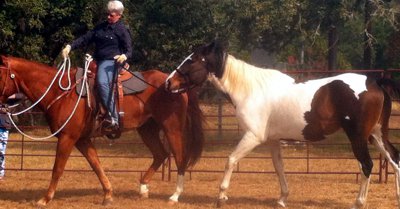Water
The November 1999 Whole Horse Journal ran an excellent article on the importance of water. Water is essential for proper digestion, electrolyte balance and cellular function. Another very important function of water is carrying toxins out of the body through urination and perspiration. Your horse requires 8-10 gallons of water a day for normal maintenance. This requirement goes much higher during hot weather or if your horse is sweating heavily. Don’t mistakenly think your horse needs less water in very cold weather. His requirements may actually increase as he consumes more roughage. Your horse’s water consumption may decrease if he is eating lush green grass, which has high moisture content.
As important as quantity of water is quality. Water buckets in stalls should be dumped and refilled daily. Many horses dunk their hay or spit out food into the water which makes it less palatable. Stalls also tend to be very dusty and the dust settles into the water. I do not recommend disinfecting water buckets unless they have been seriously contaminated by the horse defecating into the bucket or by a dead rodent or bird in the bucket. Pasture troughs should also be cleaned but do not require daily cleaning. Small amounts of algae growth in troughs does not affect water quality, but debris such as leaves and silt do. If you want to keep down mosquito larvae in pasture troughs, consider putting a few goldfish in the tank. Horses generally leave the fish alone, but some mules (no names mentioned) may bob for them and try to pitch them out.
Providing clean water delivery is pretty straightforward, but problems can occur with the water itself. Most city water is chlorinated which can wreak havoc on your horse’s delicate intestinal bacteria. If you must use chlorinated water allow it to sit for 24 hours in an open container before you offer it to your horse. This will allow the chlorine gas to leave the water. Well water can also cause problems. Nitrates or bacteria can contaminate wells. Nitrates can come from fertilizer runoff from neighboring fields or from your own manure pile. Keep your manure pile covered during heavy rain to prevent nitrogen from being washed out into the soil.
Malfunctioning septic systems or decomposing trash or animal carcasses also can contaminate ground water. Hard water, which is high in macro minerals such as calcium and magnesium, can upset your horse’s mineral balance especially if these nutrients are also being supplemented in the diet. Water with high total solids rating contains large amounts of micro minerals such as dissolved zinc, copper, iron or sulfur. This can also affect your horse’s mineral balance as well as make the water less palatable. Many people treat well water destined for human use but leave the barn water in its raw state.
One great solution to improve water quality is to collect rainwater. Most horse farms are far enough out of town to miss the worst of the city pollution, and horses really enjoy drinking rainwater. Collecting your rainwater will also decrease mud around the barn. Rain water must be stored in a light-proof tank to prevent algae growth.
If you are concerned about your water quality, consider having it tested. Your county health department should be able to test for bacteria. If you would like to test for nitrates, hardness and total solids for a small fee, contact Dottie Strickler at American Water Care in Round Rock, Texas. The number is 512-388-0022.
About the Author
Madalyn Ward, DVM, owns Bear Creek Veterinary Clinic in Austin, Texas. She is certified in Veterinary Homeopathy and Equine Osteopathy.
Memberships include American Veterinary Medical Association, American Association of Equine Practitioners, American Holistic Veterinary Medical Association, Texas Veterinary Medical Association and the Academy of Veterinary Homeopathy.
She has authored several books and publishes at her blog.
